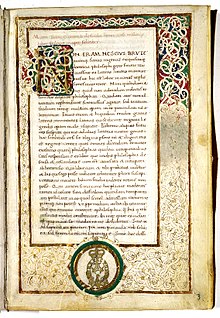An editor has performed a search and found that sufficient sources exist to establish the subject's notability. (August 2023) |
 De finibus bonorum et malorum | |
| Author | Cicero |
|---|---|
| Language | Classical Latin |
| Subject | Ethics |
| Genre | Philosophy, dialogue |
Publication date | 45 BCE |
| Publication place | Roman Republic |
| Preceded by | Academica |
De finibus bonorum et malorum ("On the ends of good and evil") is a Socratic dialogue by the Roman orator, politician, and Academic Skeptic philosopher Marcus Tullius Cicero. It consists of three dialogues, over five books, in which Cicero discusses the philosophical views of Epicureanism, Stoicism, and the Platonism of Antiochus of Ascalon (whose hybrid system mingled Stoicism with an "Old Academy" tradition of Platonism and Aristotelianism). The treatise is structured so that each philosophical system is described in its own book, and then disputed in the following book (with exception of Antiochus' view which is both explained and disputed in book five). The book was developed in the summer of the year 45 BC, and was written over the course of about one and a half months. Together with the Tusculanae Quaestiones written shortly afterwards and the Academica, De finibus bonorum et malorum is one of the most extensive philosophical works of Cicero.
Cicero dedicated the book to Marcus Junius Brutus.